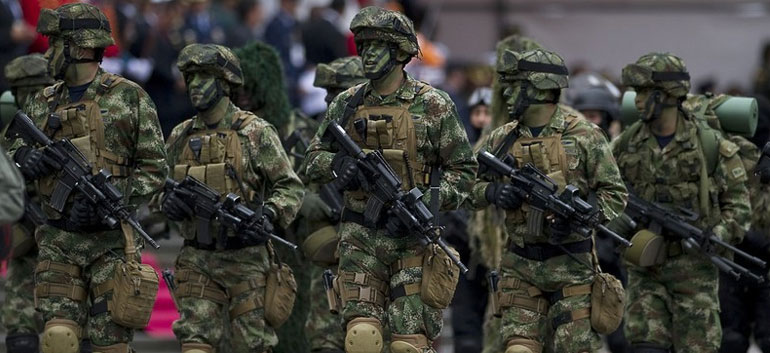The Colombian military has provided training for 21,949 foreign troops between 2009-2013, a report released by the Washington Office on Latin America (WOLA) revealed.
Citing statistics from the International Affairs Office of the Colombian National Police (CNP), the report shows that the CNP trained individuals from 47 different countries throughout the four year period.
A majority of the countries involved are heavily invested in the fight against drug trafficking; Nearly half the participants were from Mexico.
Other nations with large numbers of trainees were Panama, Honduras, and Guatemala.
Colombia’s New Role
In recent years, Colombia has increased its military and police training services in Central America, the Caribbean, and West Africa.
Current President Juan Manuel Santos has been a strong advocate of establishing Colombia’s reputation as an exporter of security services. Following his election in 2010, Santos established the “International Integral Security Coordination Strategy,” which offered a comprehensive package of security and military capacity building initiatives.
As WOLA reports, “The program offers a portfolio of a la carte services in seven areas: organizational development, counter-narcotics, organized crime, citizen security, anti-corruption, human rights and international humanitarian law, and operational capacities.”
These efforts were furthered by an “Action Plan on Regional Security Coordination,” which was developed by the US and Colombian governments in 2012. The plan aims to increase the security collaboration between the US and Colombian governments by coordinating training and aid with third party countries.
Most sectors of Colombia’s military have been involved in these training efforts, including members of the CNP’s elite jungle commandos and the Army’s Lancero Special Forces unit.
Concerns over human rights abuses
The US has repeatedly described Colombia as a “success story” and praised its role as a “security exporter.” However critics question whether the Colombian model should be emulated considering the military’s detailed history of human rights abuses.
The report by WOLA raises several other areas of concerns.
The training programs allegedly lack civilian oversight in the US, Colombia, and third party countries. This could mean that both trainers and trainees lack proper vetting to screen for any previous human rights abuses. Furthermore, information regarding the nature of the courses and the type of training that is being provided remains largely undisclosed.
Criticism has also arisen regarding the long-term consequences of providing highly specialized military training to countries whose militaries are susceptible to corruption.
The sale of military knowledge and equipment has been a key policy for the Colombian defense minister for years. The South American country is fighting a number of leftist guerrilla groups and drugs trafficking organizations, but has seen income through US aid gradually decrease over the past years.
Bogota — supported by Washington — has in turn focused on financing its massive military through alternative means like military exports.
The country is currently negotiating peace with the country’s largest rebel group, the FARC, which — if successful — is likely to force a reduction in Colombia’s own military buying power in the coming years.


